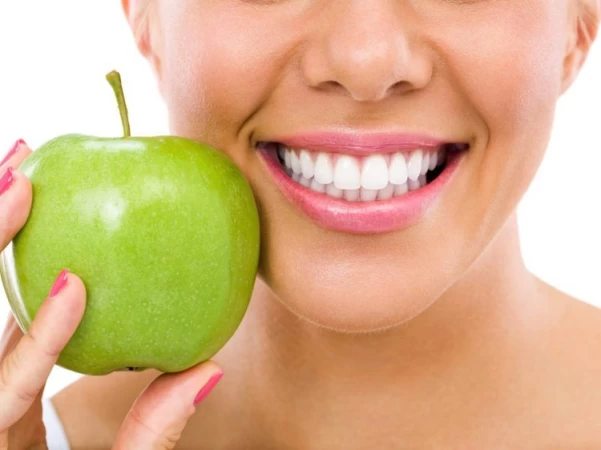Every food or beverage you intake comes in contact with your teeth, which means they directly or indirectly impact the health of your teeth as well as gums. By keeping the diet in control, you can save two of the most common disease prevailing in modern civilization, tooth decay and periodontal (gum) disease.
Decay is a result of acid products from oral bacteria and in modern lifestyle, certain foods combinations are associated with higher levels of cavity-causing bacteria. Poor diet doesn’t cause the decay directly it indirectly increases the progress of disease and becomes more severe in patients with low nutrient diets. So, it is important to focus on your diet and eat healthy to promote good oral health.
Poor Nutrition- Impacts whole Immune System
Your diet should be nutritious, a poor nutrition diet affects your entire immune system making you prone to many diseases. People with low immunity are at higher risk of teeth decay or periodontal disease. Also, research has shown a link between oral health and systemic conditions, such as cardiovascular disease, diabetes, etc.
These diseases are caused by obesity and poor nutrition. A healthy diet can help you prevent these diseases, and simultaneously protecting your oral health. Stay healthy and include a variety of good foods in your diet, it will improve your oral health and reduce the risk of other diseases.
The eating disorder impacts oral health
Just like poor nutrients, the eating disorder also affects the entire body including oral health. People suffering from bulimia in which people consume a large amount of food in a short period of time, often followed by feelings of guilt leading to vomiting can cause permanent damage to the teeth.
Next is your stomach acid, which is highly erosive and can destroy the enamel leading to the decay, cavities and tooth loss. So, before you become prone to such disease improve your eating habit and start following a healthy diet.
Sugary Drinks are responsible for tooth Decay
Added or artificial sugar are never good for the body including oral health. It can lead to obesity which is a root cause of many other diseases. On the other hand, consuming a lot of sugary product, especially in liquid form which is very harmful and leave plaque build-up over teeth giving rise to the cavity, tooth decay and ultimately its loss.
Avoid added sugar in your diet and you will realize suddenly many of your health problem will bid goodbye including the tooth issues.
Sweets are harmful
Cavities are always linked to a sugar-rich diet, sticky foods, and bad oral habits. Limit sugary food and drinks for strong teeth. Sugary food doesn’t only include candy, cookies or cakes, it also includes sodas, energy drinks, sauces, canned fruits, cereals, and even juices. So, it makes sense to check the sugar content in everything you eat and limit them as much as you can.
Eat non-stick foods.
Sticky food and the foods with high starch such as honey, raisins, bread, and potato chips can easily stick in the surface of your teeth increasing the risk of cavities. Minimizing the number of such food items, along with practicing good oral hygiene such as brushing your teeth regularly can protect your teeth from oral diseases.
Track acidic foods.
Eating fresh fruits including the items rich in citrus acid such as oranges, tomatoes, etc can also affect your tooth enamel. This doesn’t mean you have to stop eating them, instead follow a healthy regime, eat-in a regularised manner in combination with other meals and in small quantity.
Anti-inflammatory food and Balanced diet
A diet including vegetables, fruit, grains, protein-rich items such as beans, fish, etc and diary products are known as a balanced diet. It gives you required nutrients without any Side effect and plays an important role in giving a long, healthy life to your teeth as well as body. Anti-inflammatory diets include foods that don’t result in inflammation unlike saturated fats and refined foods. It also helps in maintaining healthy gums and decrease early tooth loss.
Incorporate healthy fats and calcium in your diet
What is healthy fat? The fat that is good for your heart, the body as well as oral health, such as olive oil, avocado, and fatty fish like salmon, etc. They are basically omega-3 fatty acids and including them in your diet is suggested by doctors. You can get in touch with your dietitian or dentist to know the benefits of healthy fats as well as to understand how to incorporate them into your diet plan. Calciumis a necessary element for bones and there’s are no side effect of calcium-rich diet for your teeth.
An adult needs to get 1000 to 1300 mg of calcium daily depending on age. Do include calcium-rich items such as beans, almonds, leafy greens vegetables along with milk and dairy productsin your diet.
Drink lots of water and avoid teeth-staining drinks
Drinking water washes away the sugar and leftover from your teeth while keeping your teeth clean, and gum fresh. To quench your thirst, get a glass of plain water, not cold drink. Other beverages which are not sweet as unsweetened tea or coffee are also safe for your teeth. However, few drinks are likely to stain your teeth because they contain color pigments and drinking lots of water washes away those tooth-stains easily.
Take breaks between meals
Allow some rest to your teeth, don’t eat or drink constantly, your mouth also needs rest. Keeping a gap of at least 2 hours between meals or drinks reduces the risk of tooth decay. Because the mouth produces more saliva while eating or drinking to wash away the food particles, but continuous eating especially junk food can still leave the residual impacting the oral health.
That’s how eating habit highly impacts your oral health. It’s always recommended to maintain a balanced diet, rich in required nutrients. It will not only improve your oral health, but your overall health will improve automatically.


